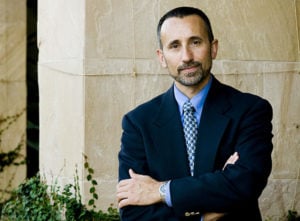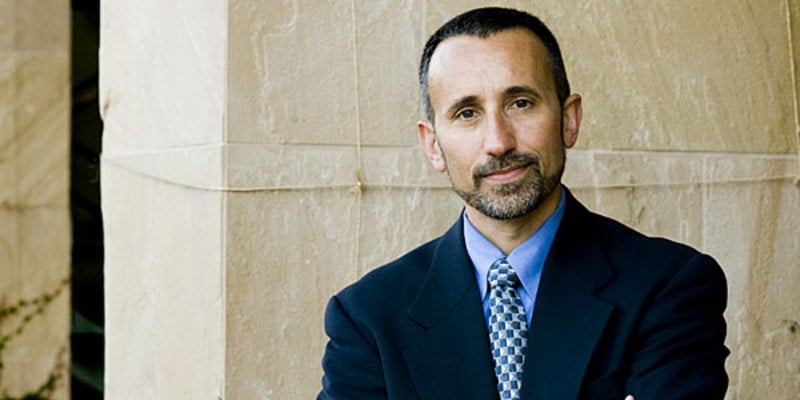
After nine years of service, Dr. Ron Albucher will be stepping down from his role as director of Counseling and Psychological Services (CAPS) at Vaden Health Center. He will remain on board as a part-time psychiatrist at CAPS, splitting his time between CAPS and his private practice in San Francisco as the program transitions to a new director next fall.
The Daily sat down with Dr. Albucher to learn more about the impact he has made during his nine years at CAPS and the challenges CAPS still faces moving forward.
The Stanford Daily (TSD): Why are you leaving your position as director of CAPS at Stanford?
Ron Albucher (RA): I came on board nine years ago and at that point was asked to begin to make some changes in CAPS. I think college mental health in general was seeing an increasing grade of acuity and a need for both the medical side of treatment as well as the psychological side, so a search began a year or two before I began looking for somebody who could help transition the organization to that new model.
I feel we’ve gotten a lot of good work done in terms of trying to keep pace with student needs, and there’s always more to do. But I also feel it’s important after this length of time to bring a fresh pair of eyes into the organization. I’ll actually be stepping down as director and going from 100 percent time at Stanford to 50 percent. I’ll stay on continuing to see students in a clinical capacity.
TSD: Could you elaborate more upon what you mean by the medical and psychological halves of mental health?
RA: With increased awareness and research in mental health, well-being [and] mental illness, it has become clear that … an individual’s psychology, their social surroundings and their biology [affects their life]. That can go all the way down to genetics — we have a propensity to inherit different illnesses outright or a tendency toward having greater amounts of symptoms like anxiety or depression. A lot of research under the biomedical model in psychiatry has looked at trying to understand this aspect of mental health and look for ways to intervene. This has led to not only a variety of medications that are available, but also other novel treatments or care, such as transcranial magnetic stimulation.
TSD: Shifting the conversation back to you, what have been some of your main accomplishments or initiatives within CAPS as the director?
RA: The clinic and its mission have changed so much since I came on board nine years ago. At that point we were still using paper charts; we were operating more so in a private-practice model where people would see students for as long as they needed to. Students would sometimes have to wait a while to get in. There was more of a focus on operating as a traditional psychotherapy clinic, which definitely has its plusses, but wasn’t meeting the complexity of needs that students had [and] the challenges they were facing as well.
One of the major shifts has been to move from that type of model to a model that offers many different things. We still do offer individual therapy, and we still offer medication evaluation and medication management and have actually expanded that. But now we have also done some other things, like significantly increasing our outreach to the community, especially traditionally underserved or underrepresented groups. We have offices all over campus now that didn’t exist when I came on board — we have offices in most of the community centers as well as other locations on campus, such as the medical school, the business school and the engineering school. I think that is a huge change — that we wanted to bring the services to the community. We experimented with different ways of doing that. For instance, in the previous year, we tried out having clinicians in some of the dorms, and having dinners with students. Students liked that, but it also didn’t provide enough anonymity for students — we found that people were not taking advantages of the counselor when it was embedded that way.
The other area where I think we’ve made a significant change is in supporting students who need higher levels of care. Any student who is admitted to a hospital for mental health reasons will have a visit by one of our case managers within a day or so. That person stays in close contact with the student while they’re in the hospital and also helps make the transition to care outside.
TSD: You mentioned that you’ve helped increase outreach to underrepresented groups. Could you specify what you mean by “outreach?”
RA: The easiest way for us to do that was to begin sending our staff to help us with reaching out to the community centers on campus. We’ve reached out to the LGBT Center, the Native American Center, El Centro Chicano y Latino, the Black Community Services Center, the Women’s Center and most recently the Muslim Community Center. Usually staff do a mixture of things — they see students, they provide on-site treatment, provided the community center can give us a private office to do that in. Oftentimes, we’ll do drop-in hours, where people from the community can come to talk or get information. This has been a way of providing a lower threshold that students have to overcome to talk with a mental health care professional. They don’t have to come all the way to CAPS, and we try to have consistent hours each week.
TSD: What challenges do you still see for the future of the CAPS program?
RA: One of the things that is increasingly the case is that Stanford both has grown the population of students on campus, but also the population of students themselves is continuing to become more diverse [and] have more complex needs. We now routinely have students contacting us before school starts, wanting to transfer their mental health care into our program. That never happened my first two years here — we never got phone calls or emails like that, and now it happens fairly often. We need to adapt to that kind of a need and encourage that, actually. We’ve even changed the forms that go out to students … We’ve now started asking about any mental health issues that they want us to know about so that we can reach out.
I think being proactive that way is a very positive thing, but it also taxes the system — we have a limited number of people and a limited number of hours each week. We’ve certainly done more with the same number of staff and my hope is that the administration will see this as a need as we grow the student population, and we’ll continue to get increased resources to meet student needs that way.
The other area that had I stayed on a little longer, I would have wanted to develop more — and still may in some capacity — is trying to develop resources on campus for more intermediate-length care. I think CAPS does a great job at on-call and emergency issues. I think we also do a great job with brief treatments. But once a brief time period has gone by, we often need to refer students for longer care out into the community. We do know that most students don’t make it to connect with somebody successfully. We’ve tried to intervene by hiring a referral coordinator who helps students in navigating their insurance company and finding out which services are covered and by whom, but even with that, most students don’t end up getting connected. I would like CAPS to develop additional resources on campus to give students — especially underserved students — access to mental health care for longer periods of time.
This transcript has been lightly edited and condensed.
Contact Claire Wang at clwang32 ‘at’ stanford.edu.
